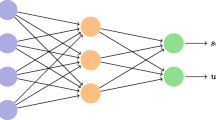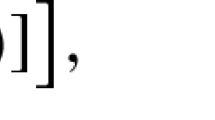Abstract
We study a new extension of the Sequential Testing problem with a modified cost structure that allows performing of some tests in batches. As in the Sequential Testing problem, we assume a certain dependence between the test results and the conclusion. Namely, we stop testing once a positive result is obtained or all tests are negative. Our extension, motivated by health care applications, considers a fixed cost associated with executing a batch of tests, with the general notion that the more tests are performed in batches, the smaller the total contribution of fixed costs to the sequential testing process. The goal is to minimize the expected cost of testing by finding the optimal choice and sequence of the batches available. The resulting NP-hard model is a variation of the set partitioning problem. We propose various heuristic algorithms for the effective solution of the problem and then demonstrate the performances of the algorithms through extensive numerical experiments.
Similar content being viewed by others
References
Alidaee, B. (1994). Optimal ordering policy of a sequential model. Journal of Optimization Theory and Applications, 83, 199–205.
Alidaee, B., Gao, H., & Wang, H. (2010). A note on task assignment of several problems. Computers & Industrial Engineering, 59, 1015–1018.
Allen, S. R., Hellerstein, L., Kletenik, D., & Tonguç, Ü. (2015). Evaluation of monotone DNF formulas. Algorithmica pp. 1–25. doi:10.1007/s00453-015-0092-9.
Berend, D., Brafman, R., Cohen, S., Shimony, S. E., & Zucker, S. (2014). Optimal ordering of independent tests with precedence constraints. Discrete Applied Mathematics, 162, 115–127.
Boros, E., & Ünlüyurt, T. (1999). Diagnosing double regular systems. Annals of Mathematics and Artificial Intelligence, 26(1–4), 171–191.
Boros, E., & Ünlüyurt, T. (2000). Computing tools for modeling, optimization and simulation. Operations Research/Computer Science Interfaces Series, vol. 12, chap. Sequential testing of series-parallel systems of small depth, pp. 39–73. Springer
Çatay, B., Özlük, Ö., & Ünlüyurt, T. (2011). Testant: An ant colony system approach to sequential testing under precedence constraints. Expert Systems with Applications, 38(12), 14945–14951.
Chang, M., Shi, W., & Fuchs, W. K. (1990). Optimal diagnosis procedures for k-out-of-n structures. IEEE Trans Comput, 39(4), 559–564.
Chu, P., & Beasley, J. (1998). Constraint handling in genetic algorithms: The set partitioning problem. Journal of Heuristics, 11, 323–357.
Cox, L., Qiu, Y., & Kuehner, W. (1989). Heuristic least-cost computation of discrete classification functions with uncertain argument values. Annals of Operations Research, 21, 1–29.
Daldal, R., Gamzu, I., Segev, D., & Ünlüyurt, T. (2016). Approximation algorithms for sequential batch-testing of series systems. Naval Research Logistics, 63(4), 275–286.
Deshpande, A., Hellerstein, L., & Kletenik, D. (2014). Approximation algorithms for stochastic Boolean function evaluation and stochastic submodular set cover. In Proceedings of the Twenty-Fifth Annual ACM-SIAM Symposium on Discrete Algorithms, SODA’14, pp. 1453–1467. SIAM
Deshpande, A., Hellerstein, L., & Kletenik, D. (2016) Approximation algorithms for stochastic submodular set cover with applications to boolean function evaluation and min-knapsack. ACM Transactions on Algorithms 12(3). Article no: 42
Duffuaa, S., & Raouf, A. (1990). An optimal sequence in multicharacteristics inspection. Journal of Optimization Theory and Applications, 67(1), 79–87.
Garey, M. (1973). Optimal task sequencing with precedence constraints. Discrete Mathematics, 4, 37–56.
Gopalakrishnan, M., Ahire, S., & Miller, D. (1997). Maximizing the effectiveness of a preventive maintenance system: An adaptive modeling approach. Management Science, 43(6), 827–840.
Greiner, R., Hayward, R., Jankowska, M., & Molloy, M. (2006). Finding optimal satisficing strategies for and-or trees. Artificial Intelligence, 170(1), 19–58.
Kaplan, H., Kushilevitz, E., & Mansour, Y. (2005) Learning with attribute costs. In STOC, pp. 356–365
Karp, R. (1972). Reducibility among combinatorial problems. In R. Miller, J. Thatcher, & J. Bohlinger (Eds.), Complexity of computer computations, the IBM research symposia series (pp. 85–103). US: Springer. doi:10.1007/978-1-4684-2001-2_9.
Reyck, B. D., & Leus, R. (2008). R&D-project scheduling when activities may fail. IIE Transactions, 40(4), 367–384.
Ünlüyurt, T. (2004). Sequential testing of complex systems: A review. Discrete Applied Mathematics, 142(1–3), 189–205.
Wei, W., Coolen, K., & Leus, R. (2013). Sequential testing policies for complex systems under precedence constraints. Expert Systems with Applications, 40(2), 611–620.
Acknowledgments
We would like to thank Hüsnü Yenigün and Uraz Cengiz Türker for helping us with the hardness proof.
Funding This study was funded by TUBITAK (The Scientific and Technological Research Council of Turkey) 1001 program grant number 113M478.
Author information
Authors and Affiliations
Corresponding author
Ethics declarations
Conflict of interest
The authors declare that they have no conflict of interest.
Additional information
We gratefully acknowledge the support provided by TUBITAK (The Scientific and Technological Research Council of Turkey) through 1001 program Grant Number 113M478.
Rights and permissions
About this article
Cite this article
Daldal, R., Özlük, Ö., Selçuk, B. et al. Sequential testing in batches. Ann Oper Res 253, 97–116 (2017). https://doi.org/10.1007/s10479-016-2345-7
Published:
Issue Date:
DOI: https://doi.org/10.1007/s10479-016-2345-7




